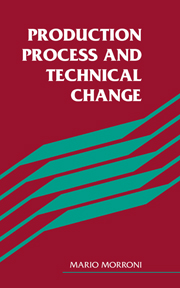Book contents
- Frontmatter
- Contents
- Acknowledgements
- Introduction: scope and outline
- Part 1 Basic concepts and hypotheses
- 1 Introduction
- 2 Technical change and the three economic dimensions of production
- 3 Production and time: preliminary definitions
- 4 Division of labour, specialization and economic efficiency
- Part 2 The model and its application
- Part 3 Economies of scale, economies of scope and production flexibility
- References
- Index
4 - Division of labour, specialization and economic efficiency
Published online by Cambridge University Press: 03 February 2010
- Frontmatter
- Contents
- Acknowledgements
- Introduction: scope and outline
- Part 1 Basic concepts and hypotheses
- 1 Introduction
- 2 Technical change and the three economic dimensions of production
- 3 Production and time: preliminary definitions
- 4 Division of labour, specialization and economic efficiency
- Part 2 The model and its application
- Part 3 Economies of scale, economies of scope and production flexibility
- References
- Index
Summary
In this chapter I will examine the relationship between organization and economic efficiency, and the influence exerted on this relationship by the characteristics of production elements (such as specialization, specificity, indivisibility and complementarity). In particular, I pose the following questions: what is the relationship between division of labour and specialization? How can the various organizational models influence the degree of division of labour? How are indivisibility, complementarity of resources and the size of the production unit related? The scheme presented in the following chapters is meant to provide useful analytical tools for dealing with these problems.
Learning processes, specificity of resources and different organizational systems
In economic literature division of labour and specialization are often considered to be synonymous (see e.g. Arrow 1979, p. 154; Landesmann 1986, p. 290; Pagano 1988, pp. 6–7). However, these two phenomena should be kept quite distinct, as they do not always coincide.
The division of labour is obviously encouraged by the opportunity of exchanging (or bartering) goods and services. Exchange, however, is not the only form in which the division of labour takes place; as is well known, in addition to the social division of labour between different activities of productive processes, regulated by the market, there is the manufacturing (or technical) division of labour among various jobs, which is regulated by the organization of the firm.
An increase in the division of labour (social or technical) may favour the specialization of labour, defined as the acquisition of specific abilities (job-specific skills) which provide a comparative advantage in the performance of a given task.
- Type
- Chapter
- Information
- Production Process and Technical Change , pp. 38 - 48Publisher: Cambridge University PressPrint publication year: 1992



